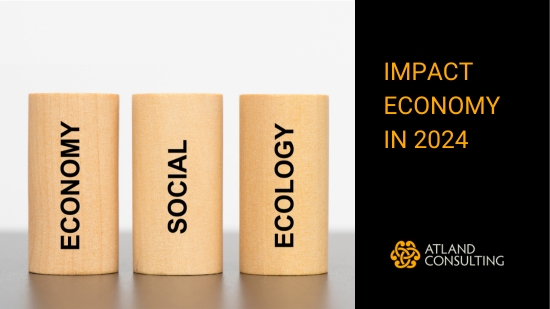2024 begins and we find ourselves in a moment of transformation and redefinition in the field of sustainability and environmental impact. We will review the emerging trends and key regulations that are shaping the world of sustainability and social impact in 2024, offering a comprehensive view of how these dynamics will influence business strategies and the labor market. It is up to us to offer critical perspectives and practical solutions to navigate these changes, highlighting our dedication to driving a positive and lasting impact on our environment and society.
In the year 2024, the landscape of sustainability and environmental impact presents several key trends, marking a decisive shift in how companies and society address these critical issues. One of the main trends is the fight against greenwashing, with the expected approval of the ‘Green Claims Directive’ by the European Parliament in the first quarter of the year. This directive aims to ensure that consumers receive reliable and verifiable environmental information about the products they consume, thus addressing the challenge of misinformation in sustainability practices. This measure is complemented by the Regulation on Ecodesign of Sustainable Products, which seeks to promote the manufacture of durable products that are easy to repair, update and recycle, incorporating ecological design requirements to improve environmental sustainability.
The need to give confidence to these approaches and labels makes us think that, with regard to the social economy, avoiding socialwashing will be a structural work to avoid the devaluation of these very necessary approaches.
The criteria of this regulation cover aspects such as durability, reuse, upgradeability, energy and resource efficiency, recycled content and monitoring of environmental and carbon footprints. The creation of a “Digital Product Passport” is also contemplated, a tool intended to help consumers and companies make informed decisions about the sustainability of products, thus facilitating the comparison and choice of greener options. This regulatory approach represents a significant change in the way companies communicate and validate their sustainability credentials, increasing transparency and reducing the risk of misleading consumers.
In parallel, sustainability is becoming a critical skill in the labor market, with significant growth in demand for professionals specialized in this field. According to the International Labor Organization (ILO), the creation of 24 million new “green jobs” is expected by 2030. This boom not only implies the emergence of new roles, but also a cultural change in companies, which are now looking for employees with technical skills and values aligned with sustainability. The consolidation of positions such as ESG Controller in financial departments is expected, reflecting how specialization in sustainability is becoming a highly in-demand profile.
This trend in employment is accompanied by a greater demand for specialized academic training in sustainability. Companies, facing the need for qualified personnel in this sector, are promoting the creation of training and education programs to cover this growing need. LinkedIn has reported a higher hiring rate for workers with “green” skills, evidencing the growing value of these skills in the labor market. However, demand for employees trained in sustainability exceeds current supply, meaning many positions will be filled through external hires, rather than internal promotions.
Beyond the labor market, there is a change in attitude towards long-term sustainable development goals. The promises for 2050 are losing credibility in the face of the urgency of concrete and measurable actions in the short term. Investors and regulators are pushing for companies to focus more on accountability for their social and environmental goals. Instead of setting ambitious, distant goals, the emphasis is shifting toward innovation and operational efficiency as a means to achieving sustainability. This change is reflected in how ESG ratings and rankings value companies’ efforts, prioritizing concrete actions and tangible results over long-term promises.
In this context, large companies are emerging as key catalysts for sustainability. The European Union’s Corporate Sustainability Due Diligence Directive (CSDD), which is expected to be fully implemented by the end of 2024, is set gives to drive significant change. This regulation will oblige companies to identify, prevent, mitigate, eliminate and repair adverse effects on human rights and the environment generated by their operations and those of their subsidiaries and value chains. It is also expected that financial institutions will begin to diversify their loans based on climate and environmental criteria, thus promoting more sustainable practices in the financial sector.
Impact investing is also gaining ground in Europe, with notable growth in assets under management by impact capital. The volume of these assets has seen growth of 21% in 2022, and this trend is expected to continue in 2024.
Integrating sustainability and impact into business strategy will be key for companies seeking to lead change in 2024. With the implementation of the Corporate Sustainability Reporting Directive (CSRD), more than 50,000 European companies will be required to include double-sided analysis. materiality in their business strategies. This means that sustainability-related risks and opportunities will become more evident to CFOs and risk managers, as well as in strategic exercises and business plans.
Finally, the measurement and monetization of environmental and social impact is becoming a crucial aspect for companies seeking to go further in their commitment to sustainability. The consolidation of standardized methodologies to measure, value and monetize impact will make it easier for companies to incorporate these metrics into their strategies and reports. Organizations such as the IFVI (International Foundation for Valuing Impacts) and the VBA (Value Balancing Alliance) are working on a standardized model that will allow companies to have information on the monetary value of their actions, thus translating sustainability into the language of those responsible for business decision making and investors.
In summary, the year 2024 is shaping up to be a key year in the evolution of sustainability and social impact, with a more rigorous and measurable focus on business practices and a significant change in the way companies, regulators and the society at large address these crucial challenges.



